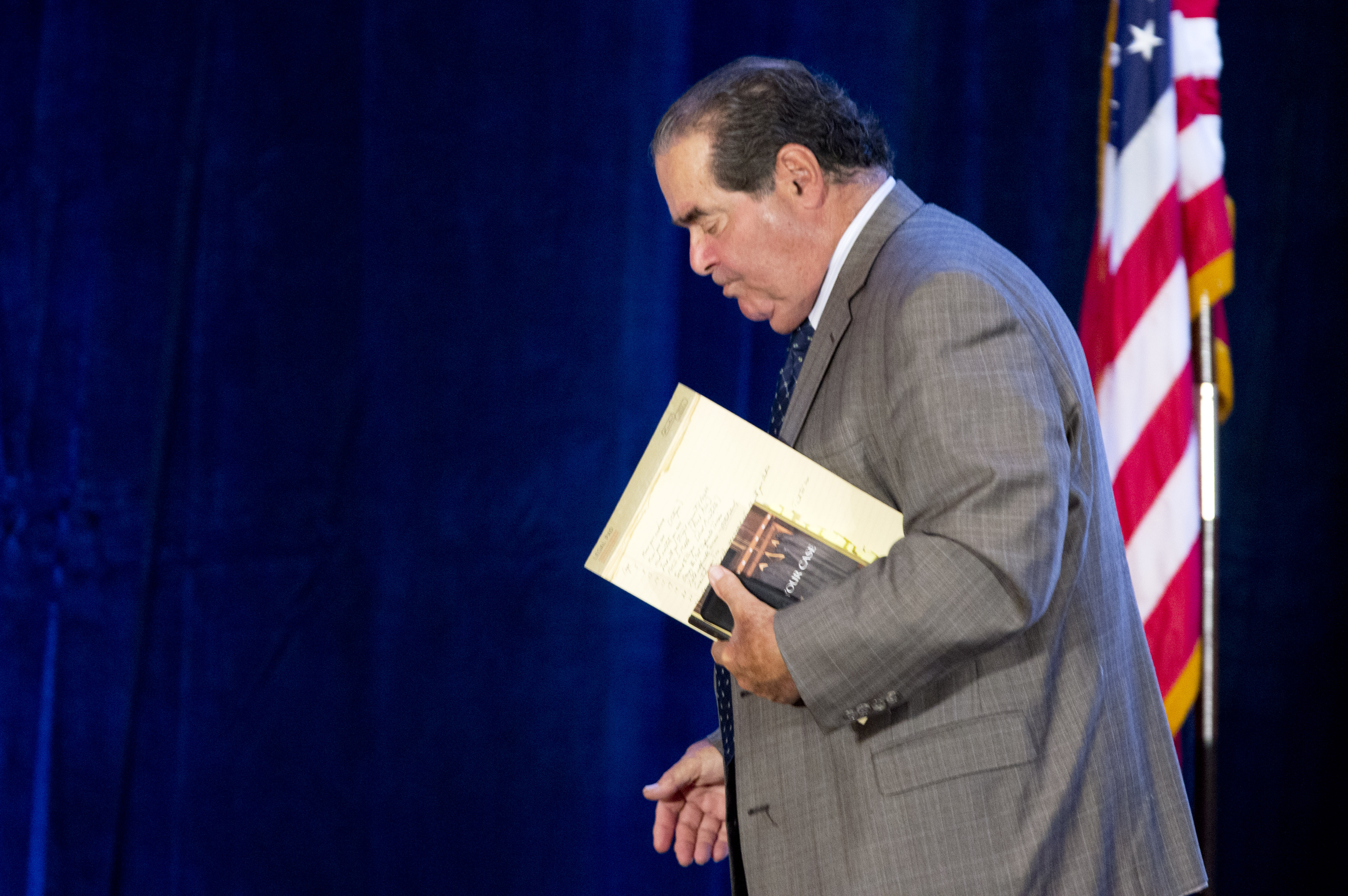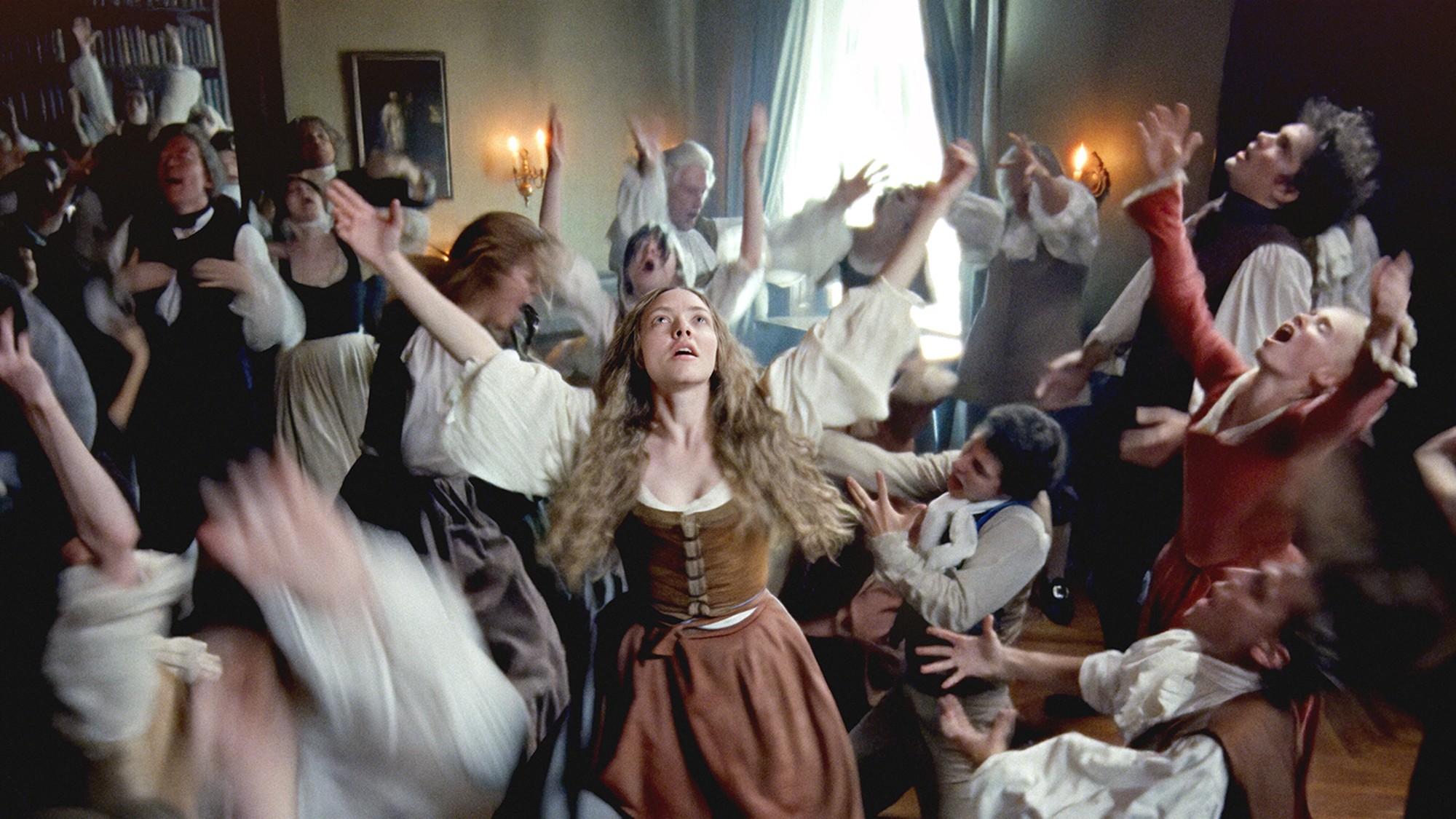Why Scalia should resign
It would be the perfect protest


Supreme Court Justice Antonin Scalia should resign.
That's the thought I had while reading his acid dissents in the two headline-grabbing Supreme Court cases last week, one affirming the IRS's interpretation of the Affordable Care Act, and the other discovering a right to same-sex marriage in the 14th Amendment.
Scalia's considered view is that the court has usurped power from Congress in the health care law, and from the American people themselves in the marriage case.
The Week
Escape your echo chamber. Get the facts behind the news, plus analysis from multiple perspectives.

Sign up for The Week's Free Newsletters
From our morning news briefing to a weekly Good News Newsletter, get the best of The Week delivered directly to your inbox.
From our morning news briefing to a weekly Good News Newsletter, get the best of The Week delivered directly to your inbox.
Ultimately, on the health care case, John Roberts agreed with most of the claims of the plaintiffs, but decided to rewrite the disputed clause because, as he writes, "Congress passed the Affordable Care Act to improve health insurance markets, not to destroy them." Scalia retorted that the court's job is to pronounce the laws, not re-shape them to better fit what the court imagines the intent of the legislators to have been. Scalia writes, "the court forgets that ours is a government of laws and not of men. That means we are governed by the terms of our laws, not by the unenacted will of our lawmaker.”
He continues:
The court's decision reflects the philosophy that judges should endure whatever interpretive distortions it takes in order to correct a supposed flaw in the statutory machinery. That philosophy ignores the American people's decision to give Congress "[a]ll legislative Powers"enumerated in the Constitution. Art. I, §1. They made Congress, not this court, responsible for both making laws and mending them. This court holds only the judicial power — the power to pronounce the law as Congress has enacted it. We lack the prerogative to repair laws that do not work out in practice, just as the people lack the ability to throw us out of office if they dislike the solutions we concoct. We must always remember, therefore, that "[o]ur task is to apply the text, not to improve upon it. [King v. Burwell]
So the court has thus transgressed the balance of powers, becoming a kind of reserve super-legislature. But his dissent on Friday against Justice Anthony Kennedy's majority opinion legalizing same-sex marriage takes the charge much further. According to Scalia, the court has given into nonsense, and now transgresses the right of the American people themselves. "The Supreme Court of the United States has descended from the disciplined legal reasoning of John Marshall and Joseph Story to the mystical aphorisms of the fortune cookie," he jeers.
Scalia's baseline assumption is that the meaning of the 14th Amendment did not change since 1868. And further that it is the prerogative of the American people, through their legislators or through constitutional amendment, to redefine marriage as an institution that includes two people regardless of their sex, a process that was well on its way. And so the Kennedy decision becomes for Scalia a "judicial putsch," where five judges "have discovered in the 14th Amendment a 'fundamental right' overlooked by every person alive at the time of ratification, and almost everyone else in the time since." Instead of law, Scalia says, the court has given "pop philosophy" and "showy profundities" that are "profoundly incoherent."
A free daily email with the biggest news stories of the day – and the best features from TheWeek.com
Scalia has often denounced majority holdings in extraordinarily memorable language. But what he offers in his two dissents at the end of this term are much graver charges. The ruling in King further infantilizes Congress, releasing it from its responsibility to craft laws with any precision, thus weakening the ability of the people to govern themselves through the legislature. And the marriage ruling more directly asserts a judicial supremacy over the people themselves. What Scalia is saying is that the court has corrupted the American form of government and staged a coup.
If these are anything more than rhetorical flashes, then it must make him wonder if he wishes to be a part of an institution that is this corrupted and corrupting of the republic. He may steel himself, as someone who will dutifully carry out his appointed role. But waiting for a Republican president to replace him is a guarantee of nothing. The two opinions that amount to a putsch were written by justices appointed by the two most conservative Republican presidents in living memory.
Progressives would be so giddy at his departure. So what? If the court is captured by politics, what better rebuke than to demonstrate that one justice is not so captured. Leaving the court would not relieve its members of the duty of upholding the Constitution. Let the burden and the obloquy of the putsch be on others.
Michael Brendan Dougherty is senior correspondent at TheWeek.com. He is the founder and editor of The Slurve, a newsletter about baseball. His work has appeared in The New York Times Magazine, ESPN Magazine, Slate and The American Conservative.
-
 6 exquisite homes for skiers
6 exquisite homes for skiersFeature Featuring a Scandinavian-style retreat in Southern California and a Utah abode with a designated ski room
-
 Film reviews: ‘The Testament of Ann Lee,’ ’28 Years Later: The Bone Temple,’ and ‘Young Mothers’
Film reviews: ‘The Testament of Ann Lee,’ ’28 Years Later: The Bone Temple,’ and ‘Young Mothers’Feature A full-immersion portrait of the Shakers’ founder, a zombie virus brings out the best and worst in the human survivors, and pregnancy tests the resolve of four Belgian teenagers
-
 Political cartoons for January 25
Political cartoons for January 25Cartoons Sunday's political cartoons include a hot economy, A.I. wisdom, and more
-
 The billionaires’ wealth tax: a catastrophe for California?
The billionaires’ wealth tax: a catastrophe for California?Talking Point Peter Thiel and Larry Page preparing to change state residency
-
 Bari Weiss’ ‘60 Minutes’ scandal is about more than one report
Bari Weiss’ ‘60 Minutes’ scandal is about more than one reportIN THE SPOTLIGHT By blocking an approved segment on a controversial prison holding US deportees in El Salvador, the editor-in-chief of CBS News has become the main story
-
 Has Zohran Mamdani shown the Democrats how to win again?
Has Zohran Mamdani shown the Democrats how to win again?Today’s Big Question New York City mayoral election touted as victory for left-wing populists but moderate centrist wins elsewhere present more complex path for Democratic Party
-
 Millions turn out for anti-Trump ‘No Kings’ rallies
Millions turn out for anti-Trump ‘No Kings’ ralliesSpeed Read An estimated 7 million people participated, 2 million more than at the first ‘No Kings’ protest in June
-
 Ghislaine Maxwell: angling for a Trump pardon
Ghislaine Maxwell: angling for a Trump pardonTalking Point Convicted sex trafficker's testimony could shed new light on president's links to Jeffrey Epstein
-
 The last words and final moments of 40 presidents
The last words and final moments of 40 presidentsThe Explainer Some are eloquent quotes worthy of the holders of the highest office in the nation, and others... aren't
-
 The JFK files: the truth at last?
The JFK files: the truth at last?In The Spotlight More than 64,000 previously classified documents relating the 1963 assassination of John F. Kennedy have been released by the Trump administration
-
 'Seriously, not literally': how should the world take Donald Trump?
'Seriously, not literally': how should the world take Donald Trump?Today's big question White House rhetoric and reality look likely to become increasingly blurred
